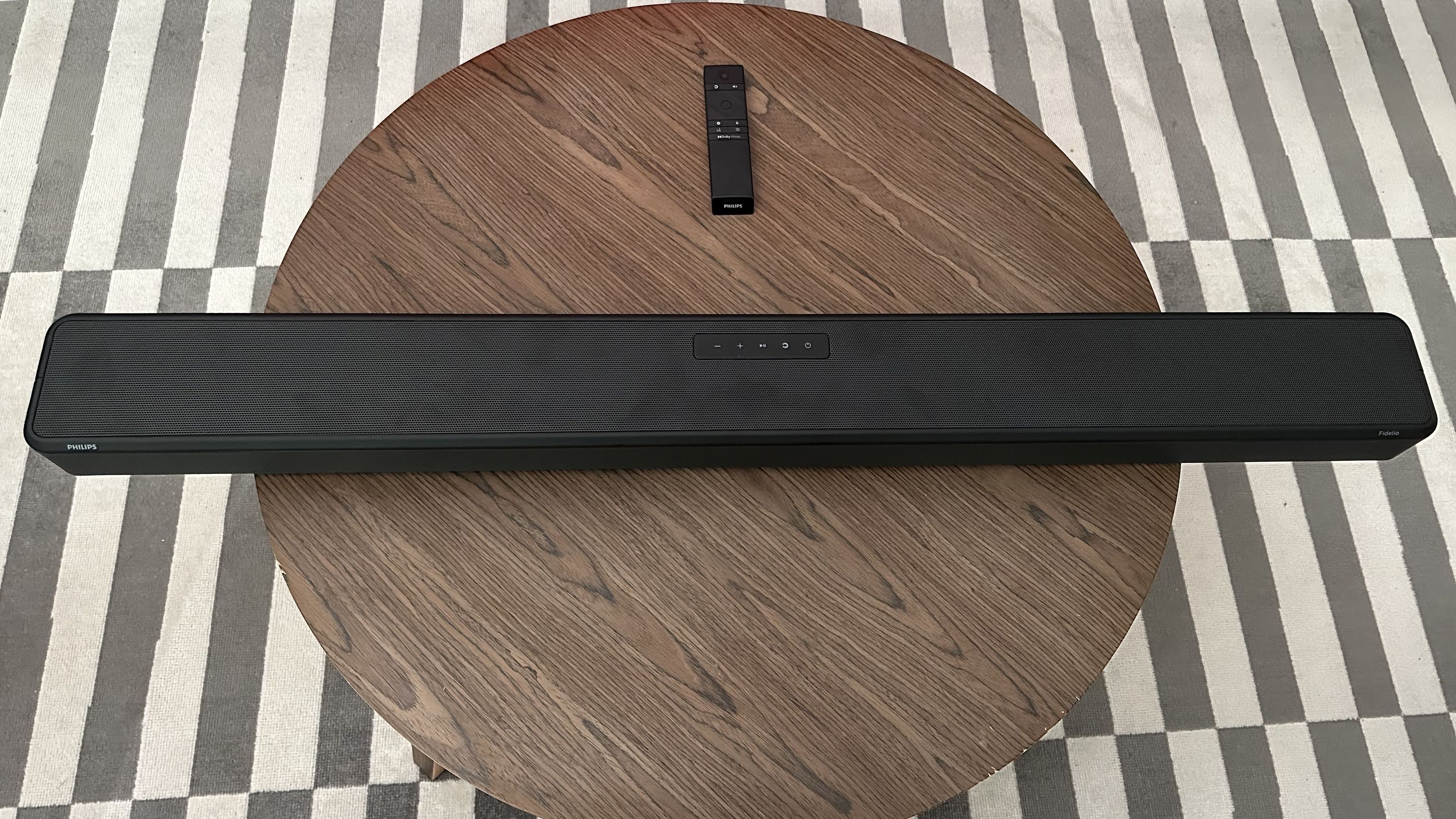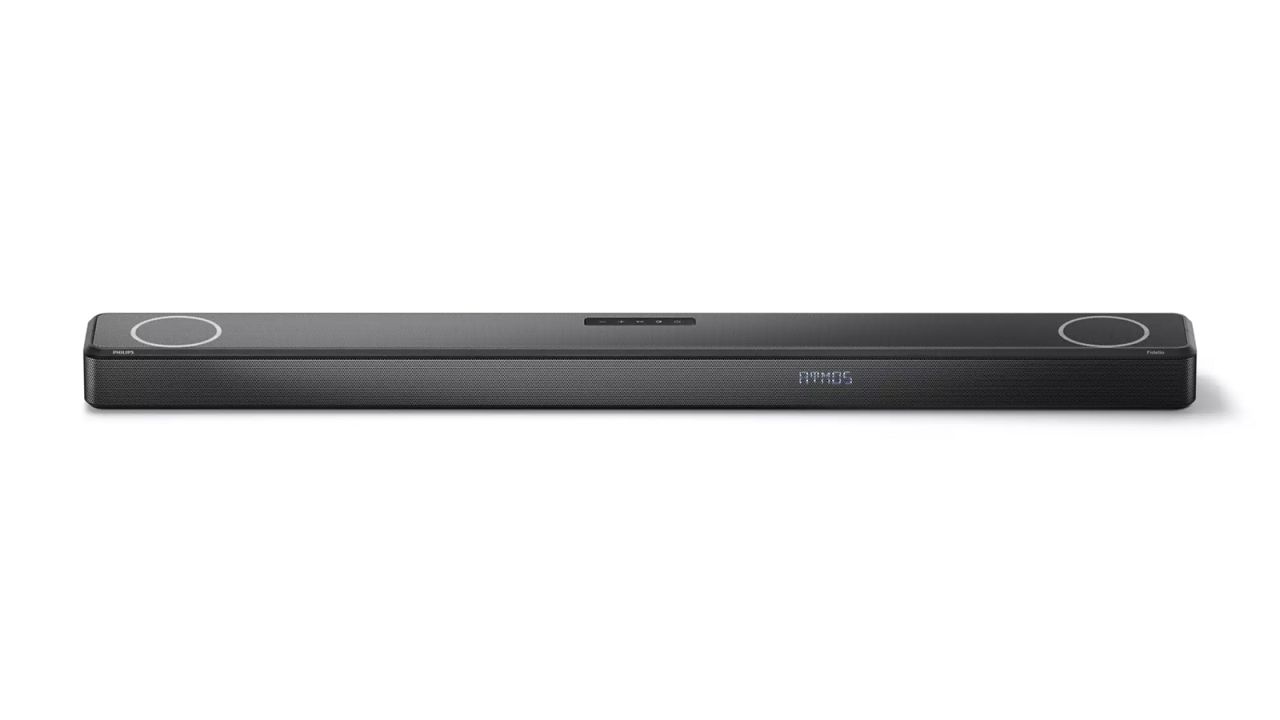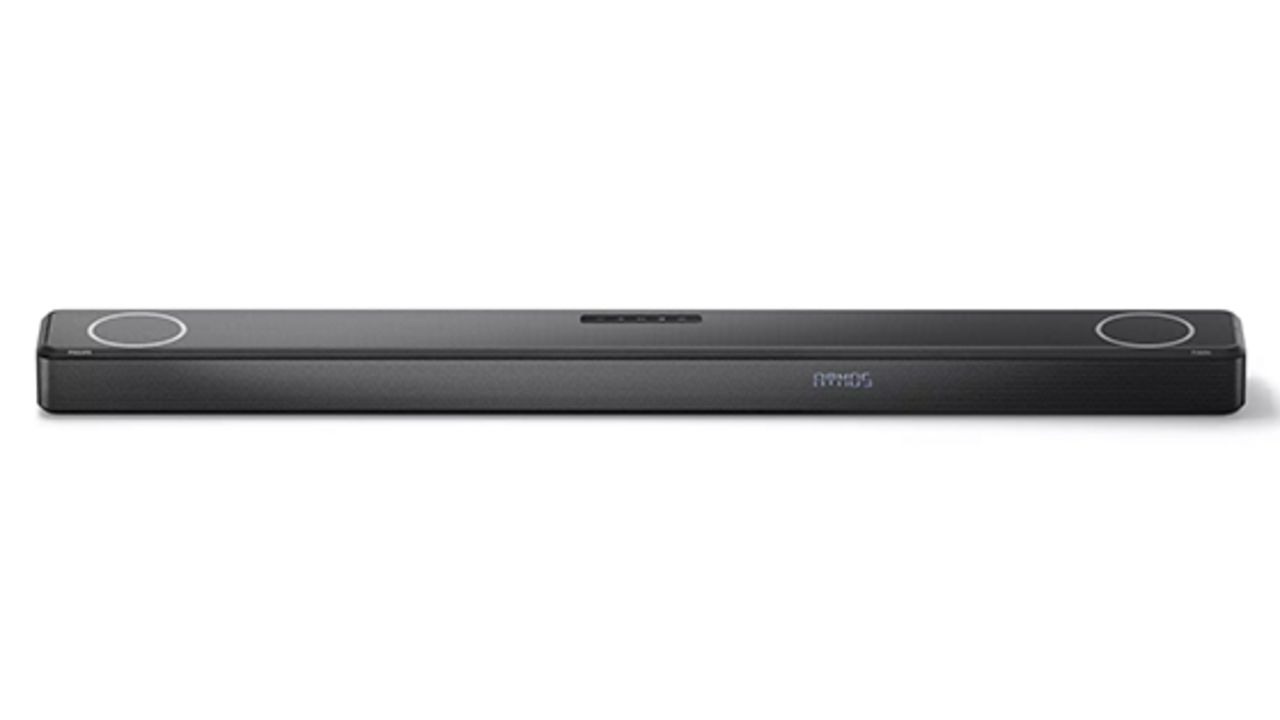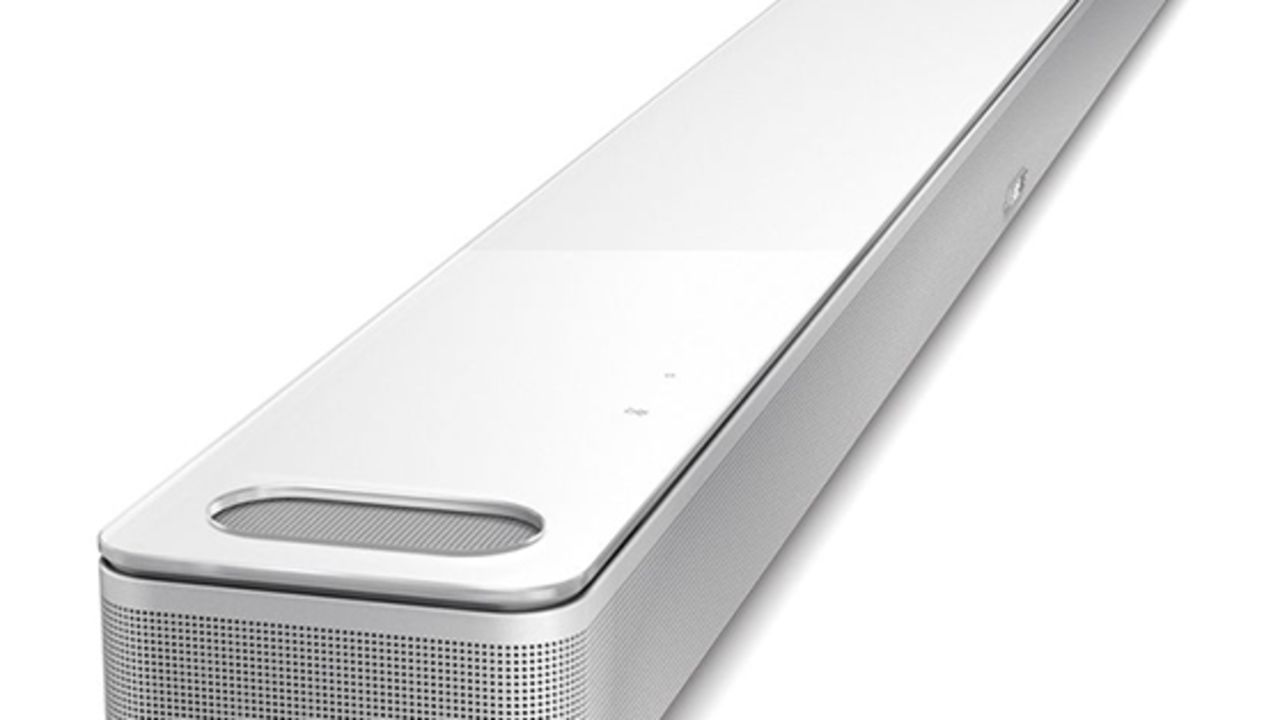If you’re looking for a premium all-in-one soundbar that can fill your room with encompassing audio — no subwoofer or separate surround speakers needed — Sonos or Bose usually come to mind. Philips wants to join that club with its Fidelio Soundbar 7.1.2 with integrated subwoofer.
Currently available for $800, the Fidelio is less expensive than Sonos’s $899 Arc or Bose’s $899 Smart Soundbar 900, and it has many of the same features as those two better-known options. But you’ll make some trade offs to save some money.
The Fidelio will impress with its wide, loud and bassy sound, all without the need for a subwoofer. But it takes work to get a sound that pleases your ears and the overall experience isn’t as smooth as it could be.
What we liked about it
Wide surround sound
Key Specs
Size: 47.2 x 4.9 x 2.9 inches
Channels: 7.1.2
Drivers: 10 full range, 3 tweeters, 2 woofers
Inputs: HDMI, digital optical, USB
Supported formats: Dolby Atmos, DTS:X, IMAX Enhanced
Connectivity: Wifi, Bluetooth
With 13 drivers and two woofers built into the soundbar, the Fidelio is primed to produce impressive surround sound, and it doesn’t disappoint. The two side-firing and two up-firing drivers spread sound widely throughout the room, with a bit more reach than the Sonos Arc and Bose Smart Soundbar 900. Part of that is because the 47.2 x 4.9 x 2.9-inch Fidelio is quite a bit bigger than the Arc and the Smart Soundbar 900.
When the Mandalorian forces zoom through the skies on Mandalore, the surround sound helped make it feel like the jet packs moved from behind me to the front of the room. When watching the 80s nostalgia montage that opens Air, the Dire Straits’ song “Money for Nothing” filled the room.
Similarly, the Fidelio created a huge sound when listening to Elton John’s “Rocket Man” and Harry Styles “As It Was” in Dolby Atmos, with especially impressive bass and full vocals. However, it didn’t sound quite as balanced as those songs do on the Arc (likely because of issues with the speaker levels. More on that below.)
Impressive bass without a subwoofer
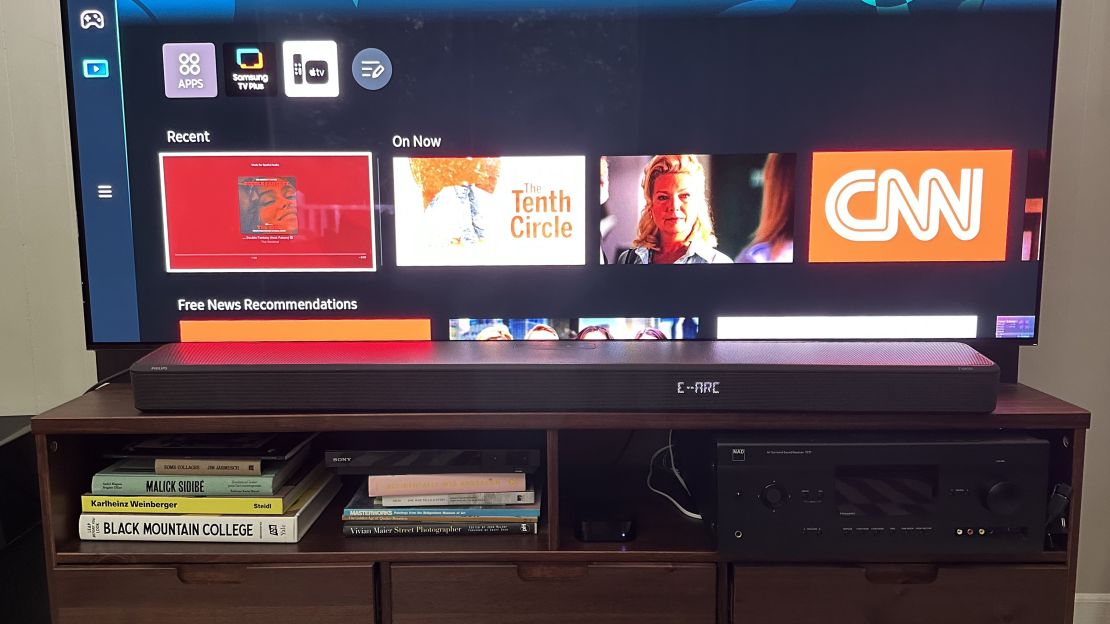
The Fidelio produced a little more low-end than the Arc and Smart Soundbar 900 — and didn’t need a subwoofer to do it.
The bass added resonance to dialog, like when Tim Robbins somberly recites the Pact in Silo. It also brings more impact to action scenes: When the Harkonnens attack in Denis Villeneuve’s Dune, the Fidelio added good oomph to the explosions, while the soundtrack swelled through the room.
If you want the floor to rumble, you’ll want to add a Play-Fi compatible wireless sub, such as the $500 Fidelio wireless subwoofer.
It gets loud
It’s kind of silly how loud the Fidelio is. If you have a very large room — or you’re hard of hearing — the Fidelio has more than enough power. I usually listened at around level 10 out of 40.
When cranked to the max, the Fidelio measured more than 90 decibels. Even more impressively, it didn’t sound too distorted at that level. Your neighbors (and your eardrums) would probably prefer you don’t listen at that volume often.
What we didn’t like about it
It takes work to set up

Soundbars are supposed to be easy — plug them in, maybe run an app to help get set up and then enjoy. The Fidelio takes a bit more work. It offers room correction to help it sound best in your environment and comes with a microphone that you connect to it so it can measure sound in the space. But Philips doesn’t mention the calibration in the quick start guide it includes, and it took some close reading of the online manual to figure out how to use it; even after I ran it, the results weren’t pleasing to my ears.
You can further adjust the sound through the PS Fine Tune app. That’s where I found out the automated process had turned the height channels up to max, which was messing with the mix — and throwing off the Atmos balance. Even after lowering the level of the up-firing speaker, I couldn’t get a balance that matched the Arc.
You need a separate app, Philips Sound, if you want to create a multispeaker home entertainment system or take advantage of multiroom audio through Play-Fi. With Play-Fi, you can connect to many different speakers, but the process isn’t as seamless as when you’re on the Sonos or Bose systems.
It lacks polish
After fixing the set up, the Fidelio performed well, but it had a few nagging issues. For example, when you start watching a movie or show in Dolby Atmos, the sound doesn’t start until you’ve been watching for several seconds. Many soundbars have a similar lag, but the Fidelio’s delay was often longer and it required me to rewind frequently to catch what I missed.
The soundbar also has an always-on display on the front, which was common in earlier days of soundbars but is something you don’t see often on premium soundbars these days. I don’t need to know at all times that the soundbar is connected to my TV via e-ARC — the display distracts from what’s important: the movie or show on the screen.
How it compares
| Size | 47.2 x 4.9 x 2.9 inches |
45 x 4.5 x 3.4 inches |
41 x 4.21 x 2.29 inches |
|---|---|---|---|
| Channels | 7.1.2 |
5.0.2 |
5.0.2 |
| Inputs | HDMI, digital optical, USB |
HDMI eARC, Ethernet, IR receiver |
HDMI eARC, digital optical, Ethernet, USB |
| Supported formats | Dolby Atmos, DTS:X, IMAX Enhanced |
Stereo PCM, Multichannel PCM, DTS Digital Surround, Dolby Atmos, Dolby Digital Plus, Dolby True HD |
Dolby Atmos, Dolby Digital, Dolby TrueHD, Dolby Digital Plus |
| Connectivity | Wi-Fi, Bluetooth |
Wi-Fi, Bluetooth, AirPlay 2 |
Wi-Fi, Bluetooth, AirPlay 2, Chromecast built-in |
| Price | $800 | $899 | $899 |
Bottom line
The Philips Fidelio Soundbar 7.1.2 with integrated subwoofer has a lot going for it: wide sound, good bass and tons of power for less money than the competition. You can also connect to more speakers through its Play-Fi integration.
But you give up some things by choosing not to pay more for Sonos or Bose — mainly ease of use. While in some ways the Fidelio can best the Sonos Arc and Bose Smart Soundbar 900 in sound quality, Sonos and Bose (the latter of which is frequently on sale) beat Philips in the overall experience. Sonos and Bose soundbars work with minimal effort; the Fidelio takes a good bit of tweaking, and some things can’t be fixed. While the Fidelio has better bass and wider sound, the sum of the parts can’t match the balanced sound of our high-end best soundbar pick, the Arc.
